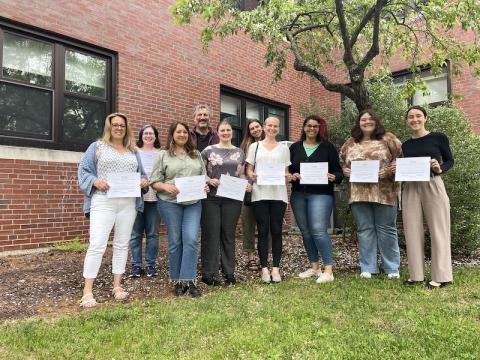
Westfield State University Awarded $5 Million from 2017-2024 to Transform Behavioral Health Education and Accessibility

Newly graduated students from the Masters of Social Work program.
In a groundbreaking initiative spanning from 2017 to 2025, Westfield State University has been awarded over $5 million to enhance the quality, training, and accessibility of behavioral health services across the state. This collaborative effort involves federal and state funders such as the Health Services and Resources Administration, the Massachusetts Department of Mental Health, and RIZE Massachusetts. These three separate funders support the University in its expertise with providing training in community mental health, harm reduction, and integrated healthcare by providing training stipends. This year alone, over 80 students who completed their training across these fields of study received a total of $830,000.
Following these developments, the University then established trainings for interdisciplinary teams of students pursuing social work, physician assistant studies, and mental health counseling. Notable representatives of these programs include Dr. Maureen Clark, Assistant Professor of Social Work; Dr. Susan McDiarmid, Assistant Program Director of the Physician Assistant Program; Dr. Bob Hayes, Professor of Psychology; Dr. Nora Padykula, Interim Dean of the Division of Graduate and Continuing Education; and Tyrese Tillman, Director of Social Work Practicum Education.
This influx of funding marks an unprecedented consolidation effort across Westfield State’s integrated and interdisciplinary healthcare teams in the hopes of enhancing community healthcare training and providing harm reduction training stipends for aspiring healthcare professionals within underserved areas across Western Massachusetts. These stipends aim to augment their rigorous education and better prepare them for their future roles in the healthcare sector. As the University continues to be committed to training experts in their field, this allotment of funds will bolster opportunities for students to work more deeply within their chosen studies.
The significance of this funding is particularly emphasized due to the existing shortage in the behavioral health workforce. These funds are expected to not only support eager students but also contribute to building greater health equity and access to care across the region. Students will not only receive comprehensive clinical training in community mental health centers and collaborate within interdisciplinary teams, but also apply essential practices such as harm reduction and patient-centered care throughout their education.
Dr. Padykula highlighted the critical role of this initiative, commenting, “Building the behavioral health workforce is crucial to meet the needs of Western Massachusetts. Each student completes hundreds of training hours in the community and are prepared to help our community partners fill the gaps in their workforce.”
She further elaborated on the ongoing efforts preceding this significant funding allotment, emphasizing the University’s dedication to providing high-quality education in the interest of improving community health and resources. “Since 2017, the University has provided over $2 million to students for paid internships and rotations. Westfield is known for a standard of excellence that prepares social workers, mental health counselors, and physician assistants to provide integrated healthcare services.”
Dr. McDiarmid echoed these sentiments and celebrated the synergy and teamwork between University programs. “This truly is a revolutionary grant and the first of its kind for the Massachusetts Department of Mental Health,” she said. “Working inter-professionally as behavioral health teams help improve outcomes for all patients and clients. By funding internships, also known as practicums and clinical rotations or clerkships, the hope is to inspire some graduates of the social work, psychology, and physician assistant students to work in the behavioral health field in Massachusetts.”
This substantial funding allocation and collaborative efforts at Westfield State University represent a pivotal step towards addressing critical workforce shortages in behavioral health. With a focus on enhancing education, clinical training, and access to care, this initiative sets a strong foundation for future healthcare professionals to make a meaningful impact in improving mental and physical well-being across Western Massachusetts.


